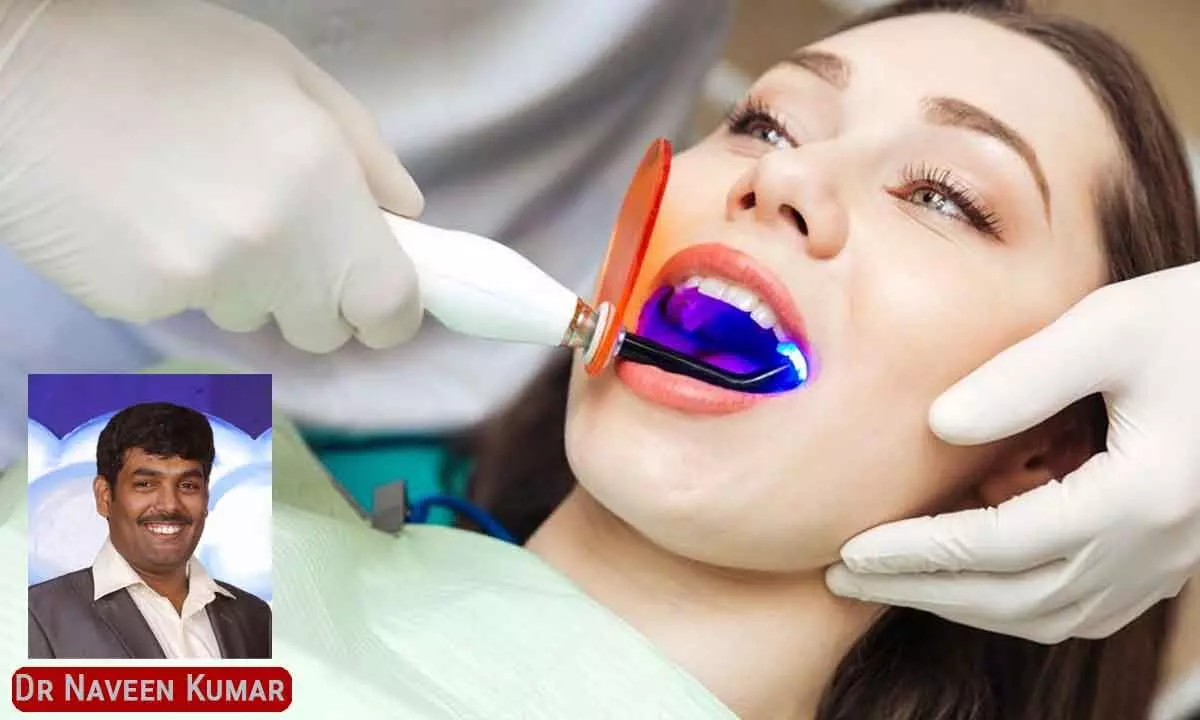Live
- MP BJP to celebrate former PM Vajpayee's birth anniversary on Dec 25
- Christmas Eve 2024: Heartwarming Messages To Share With Your Loved Ones
- PM Modi holds brainstorming session with economists in run-up to Budget
- “Telangana Ready to Support AI Technologies That Drive Social Impact,” says Special Chief Secy, Jayesh Ranjan at Woxsen University’s Future Tech Summit 2024
- Hero Motosports Team Rally Announces Squad For Dakar Rally 2025
- Two Men Found Dead In Parked Caravan In Kerala
- Mandhana moves closer to top spot in ODI, T20I rankings
- IND vs AUS Boxing Day Test 2024: Sam Konstas Debuts, Travis Head’s Fitness in Question
- Congress Challenges Election Rule Amendments In Supreme Court
- Jaishankar’s US Visit: Key Diplomatic Engagement Amid Leadership Transition
Just In
Harnessing the power of lasers: Transforming oral hygiene in dentistry


Dr Naveen Kumar T, BDS, Certified BPS Dentist (Switzerland) Implantologist from Naveen Super Speciality Dental Hospital Vanasthalipuram talks about oral hygiene
Maintaining optimal oral hygiene in dentistry is fundamental to achieving and preserving a healthy and radiant smile. Traditional oral care practices, such as regular brushing, flossing, and dental check-ups, play an indispensable role. However, laser technology has revolutionised the field, offering dentists various advanced tools to enhance oral hygiene practices and provide more precise and minimally invasive treatments. In this article, we will explore the transformative role of lasers in dentistry, shedding light on their applications and benefits in various oral care procedures.
Lasers in Dentistry: A Paradigm Shift
Lasers, which produce intense, highly focused beams of light, have gained immense popularity in dentistry for their ability to target and interact with specific tissues precisely. The introduction of lasers has transformed how dental professionals approach diagnostics, treatments, and oral health maintenance. The following are some key areas where lasers have significantly impacted dentistry:
Cavity detection is essential for early identification and treatment of tooth decay, employing methods such as visual examination, X-rays, and advanced laser technology. Lasers have revolutionised this process, enabling precise detection of even the slightest signs of decay. In cases where decay reaches the tooth’s pulp, a root canal treatment becomes necessary. This procedure involves removing the infected pulp, cleaning the root canals, and sealing them to restore the tooth’s health, alleviate pain, and preserve natural teeth. With the aid of lasers, dentists can perform targeted root canal treatments, ensuring optimal oral well-being and preventing further complications.
Periodontal (Gum) Disease Treatment:
Lasers have proven to be effective in treating gum disease (periodontitis). With their ability to selectively remove infected tissue and bacteria while preserving healthy gum tissue, lasers aid in promoting gum tissue regeneration. Laser-assisted periodontal therapy significantly reduces the need for traditional invasive procedures, reducing discomfort, minimal bleeding, and faster healing.
Oral Surgery and Soft Tissue Procedures:
Lasers have transformed the landscape of oral surgery and soft tissue procedures. They are utilised in various treatments, including gum reshaping, frenectomy (tongue-tie correction), removal of oral lesions, and biopsies. Lasers provide precise control and allow for minimally invasive procedures, resulting in reduced trauma, improved patient comfort, and accelerated healing.
Teeth Whitening:
Laser-assisted teeth whitening procedures have gained popularity due to their ability to enhance the effectiveness of bleaching agents. The laser activates the bleaching solution, accelerating the whitening process and providing patients faster and more noticeable results.
Benefits of Laser Dentistry:
The integration of lasers in dentistry offers numerous advantages over traditional methods:
Precision: Lasers allow for highly targeted treatment, minimising damage to surrounding healthy tissues.
Minimally Invasive: Laser procedures are often less invasive, resulting in reduced discomfort, minimal bleeding, and faster healing times.
Reduced Need for Anesthesia: Laser treatments are less painful, reducing the need for local anaesthesia in many cases.
Improved Sterilisation: The high-energy beam of lasers sterilises the treated area, minimising the risk of infection.
Enhanced Patient Experience: Laser procedures often reduce anxiety and improve patient comfort.
Faster Recovery: Due to their minimally invasive nature, laser treatments promote quic ker healing and reduced downtime.
(Email Id: [email protected], Ph: 9885210601, 8125087234 and 040- 24020601)

© 2024 Hyderabad Media House Limited/The Hans India. All rights reserved. Powered by hocalwire.com






